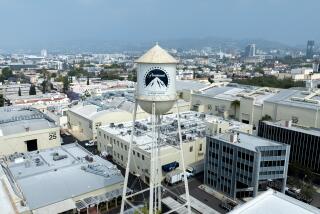Linking Up With a Rising Star on the Global Dial : Television: When Richard Li Tzar-kai Li launched pan-regional Star TV, skeptics said he was crazy. Now the 26-year-old founder has sold Rupert Murdoch a $525-million stake in his operation.
HONG KONG — Guns N’ Roses are rocking on MTV, but 26-year-old Richard Li Tzar-kai Li doesn’t notice. “Lou Grant,” the BBC news, a Mandarin-language soap opera and a tennis tournament are playing on the four other TV screens in his office, but Li ignores them, too--he’s busy snapping orders at one of his executives.
Li’s Star TV is the hottest thing in global television, a pan-regional network that’s beating out potential rivals and astonishing advertisers. Star TV--which stands for Satellite Television Asian Region--has five round-the-clock channels that are received in 38 countries stretching across eight time zones, a borderless market that reaches from Asia to the Middle East.
Star has at least 45 million viewers, the most coming from China, India, Taiwan and Israel--two-thirds of the world’s potential TV viewers and the world’s largest untapped consumer market. Star’s “footprint” reaches 2.7 billion people--among them more English speakers than in North America.
Now Li, who was bankrolled by his father, Li Ka-shing, just made a bundle selling media baron Rupert Murdoch a fat stake in Asia’s first pan-regional satellite.
On July 22, Li and his financial adviser secretly joined Murdoch on board his yacht, the Morning Glory, off the coast of Corsica. “We negotiated about two hours, faxing back and forth to our people in Hong Kong. Then Rupert and I sat across the table and signed the documents,” recalls Li, in his clipped Hong Kong/upper-class Brit accent. “It’s been a wild ride.”
It’s also been a wildly profitable transaction for the Li family. Murdoch’s News Corp. is shelling out $525 million for a controlling stake of 63.6% of HutchVision Ltd. (BVI), which markets Star TV. But it leaves control of HutchVision Hong Kong, the company licensed to operate the satellite uplink for Star TV, with the Li family. This frees Murdoch from Hong Kong regulatory problems.
Based on the sale price, Star is valued at $825 million--or about six times the initial investment.
Skeptics snickered when Li and seven employees launched Star TV, fueled by his father’s millions. They called him crazy, too young and too inexperienced. “We were a bunch of crazies,” recalls Li. “It was never done before.”
Now Li’s critics are calling him crazy as a fox. Star’s brash boss has won his corporate stripes and shown his demanding father that he can wheel and deal with the big boys.
The network offers viewers something beyond the staid government-controlled airwaves. Instead, they get uncensored BBC news, “Donahue” and “Lifestyles of the Rich and Famous.” Star may be fueling a revolution of rising expectations as it sandwiches the now-defunct NBC soap opera “Santa Barbara” and MTV between McDonald’s and Coca-Cola ads. Chinese are learning about Levi’s and Pakistanis are discovering Kellogg’s Corn Flakes. Star is Coca-colonizing Asia, turning it into an advertising bazaar.
Murdoch’s News Corp. owns Fox Broadcasting Corp., which provides programs for its own eight TV stations and 139 affiliated stations. It also owns 20th Century Fox, with an attractive library of movies and TV shows for program-hungry Star.
One quickly forgets that the sharply tailored Li, sitting in his unpretentious office overlooking Victoria Harbor and his father’s vast array of properties, is only 26. When asked personal questions during an interview, Li flinches as if he were thrown a live grenade; but when asked about business, he loosens up, talking as if it were his very lifeblood. It is--he and his brother Victor were weaned on it by the King of the Hong Kong business world.
“Neither Victor nor I went to business school--we had the best professor at home, nearly every dinner conversation was about business,” explains Li proudly. “K.S. (Li’s father) taught me how to make money. When I was 8, he put me in a little chair in the corner at executive board meetings. K.S. thinks about business about 90% of the time.”
And so seemingly, does his youngest son. When asked what motivated him to enter the risky world of television, Li is blunt. “Using technology to break barriers and bring people together was the human side. But frankly, 95% of my motivation was business, pure business. Disposable incomes in Asia were growing far ahead of the news and entertainment that was available. We created Star to fill that gap.”
Li continues to work up to 16 hours a day in Star’s headquarters in Hutchison House, a Li family skyscraper. He leaves his bachelor digs for a 6 a.m. ocean swim, then drives himself to work in his Toyota Camry. “My top executives drive flashier cars,” he says, subtly trying to make the point that he’s no yuppie. “And I pay them more than I’m paid.” Now the execs at Star are having plenty of Maalox moments, waiting to see which heads roll under Murdoch. When Li walks the corridors, his employees, mostly expatriate gweilo (or foreigners) from 18 countries, snap to attention. When asked about his management style, they request anonymity. Some describe Li as “autocratic,” others say “abrasive.”
“Richard’s a hard-driving, mercurial boss,” says one. “He’s not afraid to flash his temper or berate us in meetings or call at 3 a.m.”
Listening to the charges without showing surprise, Li lights up a Salem. “Some complain I’ve been very rough, harsh, but there was no other way. To put up five channels in 12 months, sometimes I needed to be abrasive. We went from seven employees to 500 in 18 months. If I had to do it again, I’d do it the same way.”
News Corp.’s technology director Peter Smith says News Corp. brings access to its films and TV shows and also the techniques required to run a subscriber TV system.
The wealth of English-language programs the Murdoch transaction will bring in means Star will no longer have to offer an endless diet of “Love Boat” and “Hill Street Blues.” Star also reportedly has “memorandums of understanding” to buy programs from Disney, MCA, Sony Corp.’s Columbia Pictures and TriStar, and MGM--but no firm deals yet.
So far, Star has been financing its programs entirely through ads. “At the beginning,” explains Li, “we had to take what programming we could get, because no one thought it could be done, so it was like cultural imperialism. Lately, I’ve been pushing to ‘Asianize’ the network.”
In Li’s push to “Asianize” Star, he’s made plans to produce about 30 Mandarin-language films, a daily soap opera and a series of game shows in China. And Li has been negotiating with his father’s golfing buddy, Raymond Chow, who owns Golden Harvest, for programs for a new Chinese-language pay channel. Also in the works are plans for Hindi, Mandarin, Arabic and Urdu educational channels.
The only programming Star currently produces is the Asian-style MTV. Don Atyeo, MTV general manager, recalls that when Star began, the Western videos weren’t “hitting the right buttons, or clicking culturally. Richard forced us to Asianize faster than we anticipated--and we got audiences we hadn’t dreamed of.” When MTV started airing 80% Asian videos (Indian, Chinese, and Korean) millions of young entertainment-starved viewers tuned in.
Li also helped select MTV’s Asian and part-Asian “video jocks.” They’ve become bigger than rock stars, and have set off mob scenes on visits to Dubai and Bombay. Israelis, Indians and Indonesians are bombarding them with mail. Li also had MTV show videos to match the musical tastes in Star’s eight different time zones. For example, at 3 a.m. Hong Kong time, Star runs more European videos because the Middle East is watching. And since much of the 38-country satellite footprint is Muslim, Star has taken a conservative programming approach. MTV, for example, afraid of offending viewers, doesn’t air Madonna’s explicit “Erotica” video and won’t advertise hard liquor.
“We paid a lot of attention to making sure we’re sensitive to the cultural aspect across the footprint,” Li explains. But not everyone agrees. India’s Information Minister K.P. Singh Deo, for example, charges that India is “facing what may be described as a cultural invasion.” In Pakistan, Star’s soaps and MTV videos have drawn protests from Orthodox Muslims.
Rejecting accusations of cultural insensitivity, Li stresses that it’s “hard to please everyone with a service which can be picked up in 38 countries.”
“China, Hong Kong and Taiwan--the greater China region--will be the world’s highest growth areas,” predicts Li, noting how slow the United States has been realizing it. During his years at high school in Palo Alto and at Stanford, where he studied electrical engineering, Li was “shocked” when he saw how little Americans understand about Asia. “People asked me if we ate dogs, if we have starving people in Hong Kong. I even get letters from America addressed: ‘Hong Kong, Japan.’
“America can’t afford to be so parochial,” he warns. “And in television, they’re surprisingly insensitive to the Asian market.” But he and former Australian-turned-American Rupert Murdoch aren’t. “We both understand the vast commercial possibilities the fast-growing and increasingly affluent Asian and Middle Eastern audiences offer.”
As he hands off day-to-day control and becomes an “adviser” to Murdoch, will Li miss the entertainment business? “I wouldn’t say that show business people are exactly my kind of people,” says Li, who feels more comfortable with men in Armani suits than in Levi’s. “They seem to have different priorities. They are very creative and energetic, very different from engineers and accountants. I prefer making money.”
More to Read
The biggest entertainment stories
Get our big stories about Hollywood, film, television, music, arts, culture and more right in your inbox as soon as they publish.
You may occasionally receive promotional content from the Los Angeles Times.










